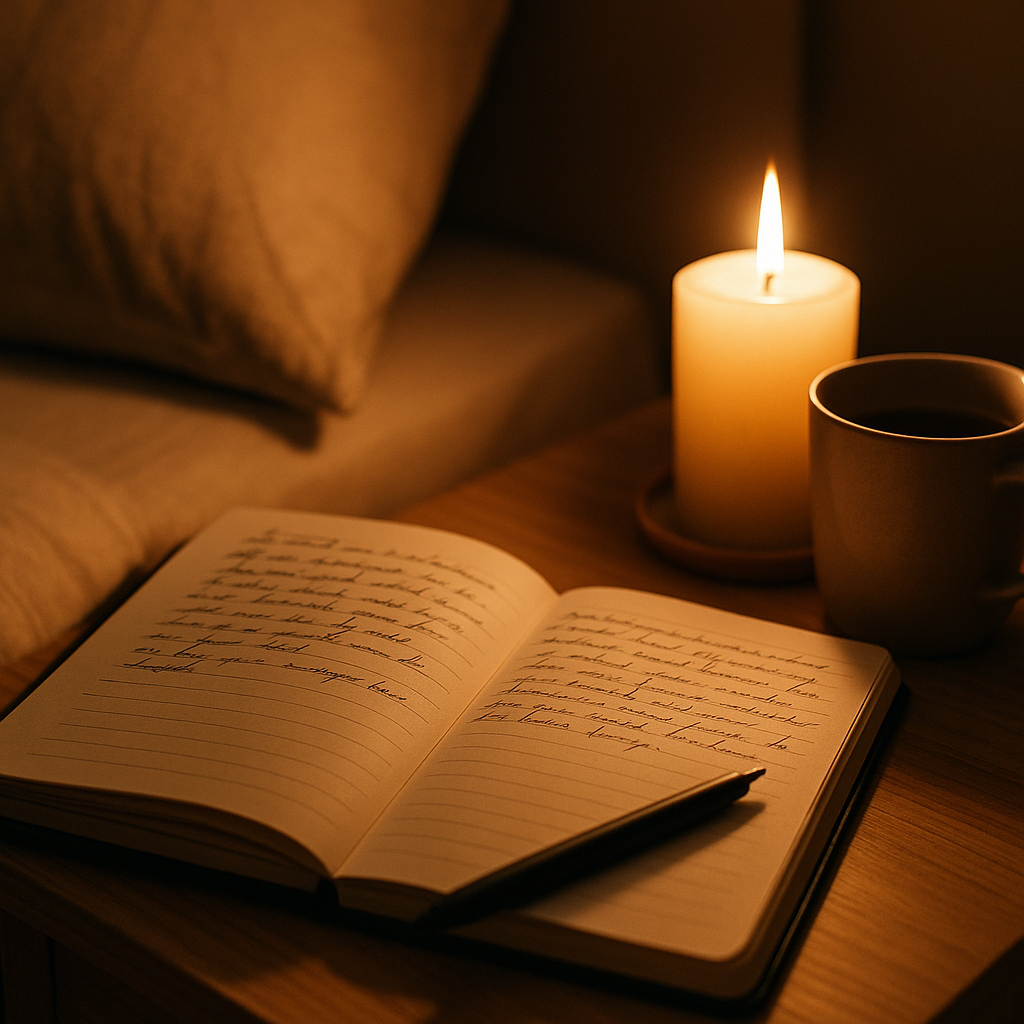Contents
Ever lie awake staring at the ceiling while your brain runs through tomorrow’s to-do list, yesterday’s regrets, and everything in between? That mental chaos is exactly why journaling before bed has become a go-to ritual for better sleep and calmer nights. It’s not hype—it’s backed by both personal experience and real studies.
By simply writing down your thoughts before sleep, you signal to your brain that it’s safe to rest. Whether you’re feeling anxious, distracted, or emotionally drained, journaling before bed can help you let go, slow down, and actually fall asleep easier.

Why Journaling Before Bed Helps You Sleep
Most people try to fall asleep while still mentally “on.” The brain’s still solving problems, worrying, or rehashing the day. But journaling before bed gives your mind a structured way to unload, so you’re not carrying those thoughts into the night.
A 2018 study in the Journal of Experimental Psychology found that writing down upcoming tasks helped participants fall asleep significantly faster than those who didn’t. Why? The act of offloading thoughts reduced cognitive arousal—the brain’s racing activity that often delays sleep.
Another review in Advances in Psychiatric Treatment supported this: expressive writing (which includes journaling) helps lower intrusive thoughts and improves emotional clarity—two key ingredients for restful sleep.
Mental Health Benefits of Journaling Before Bed

Beyond sleep, the benefits of journaling before bed ripple into your mental and emotional health. A regular nighttime journaling habit can:
- Reduce anxiety by helping you identify and process what you’re really feeling
- Improve mood by creating space for gratitude and positive reflection
- Increase emotional regulation by building awareness and reducing reactivity
One study published in JMIR Mental Health found that individuals who journaled for just 15 minutes a night experienced noticeable improvements in anxiety and depression over 30 days.
Another study in Applied Psychology: Health and Well-Being found that people who wrote down what they were grateful for slept longer and better.
What to Journal at Night
You don’t need to be poetic or profound. The most effective journaling before bed is honest and simple. Try one of these two approaches:
Gratitude Reflection
Write down 3–5 things you appreciated today. They don’t have to be big—just moments that felt good, comforting, or positive.
Mental Download
Empty your mind. Jot down your worries, what’s on your mind, or anything left unresolved. Treat it like a mental inbox: once it’s out of your head and on the page, it’s handled—for now.
Keep your journaling relaxed. You’re not writing a memoir—you’re creating mental space.
How to Start a Journaling Before Bed Habit
Starting a journaling before bed habit is easier than you might think. Pick a consistent time, ideally 15 to 30 minutes before sleep. Find a quiet space. Dim the lights. Use a pen and notebook—it helps slow your thoughts.

You don’t need to follow a rigid structure. Some nights you may write two lines. Others, two pages. That’s okay. What matters is consistency and honesty.
Many people find journaling even more powerful when paired with another calming ritual like reading before bed. In fact, both have complementary benefits. Reading helps shift your nervous system into relaxation mode, while journaling clears mental noise. Doing both creates a strong signal that it’s time to wind down.
You might write for five minutes, then read a few pages of a book. Or the reverse. Either way, you’re building a gentle transition into sleep—one that supports both mind and body.
Stick with it for a week or two. Like any habit, the results build over time. You’ll likely find yourself falling asleep faster and waking up with a clearer, calmer mindset.
Frequently Asked Questions About Journaling Before Bed
Q: How long should I journal before bed?
You don’t need a long session. Even just 5–10 minutes can make a noticeable difference. Some nights you may write more, other nights less. What matters most is consistency, not word count.
Q: What if I don’t know what to write about?
Start with a simple prompt:
- What’s on my mind right now?
- What went well today?
- What’s one thing I’d like to let go of before bed?
Once you begin writing, thoughts tend to flow. Don’t overthink it.
Q: Is digital journaling okay, or should I use paper?
Both work, but paper is slightly better for sleep. Writing by hand helps you slow down and stay away from screens that emit blue light, which can interfere with melatonin production.
Q: What if journaling makes me dwell on negative emotions?
That’s valid—and it’s why combining styles helps. If you write about a worry, balance it by ending with one thing you’re grateful for. This helps shift your emotional tone and prepares you for a restful state.
Final Thoughts
Journaling before bed is a low-effort, high-impact habit that can completely change your nighttime routine. It helps you sleep better, worry less, and feel more grounded. And with just a few minutes a night, the benefits of journaling before bed begin to show up fast.
Start small. Grab a notebook, set aside five minutes, and simply write. No rules. No pressure. Just a quiet space to release what’s in your head and make room for rest.
Better sleep is waiting—and it might just begin with a pen and a page.
Sources
- Scullin, M. K., & Price, R. B. (2018). Journal of Experimental Psychology: General. https://doi.org/10.1037/xge0000374
- Emmons, R. A., & McCullough, M. E. (2009). Applied Psychology: Health and Well-Being
- American Psychological Association: https://www.apa.org/monitor/2012/04/emotional
- Baikie, K., & Wilhelm, K. (2005). Advances in Psychiatric Treatment
- Prociow, P., & Crowe, M. (2021). JMIR Mental Health

1 thought on “Journaling Before Bed: The Sleep Habit That Actually Works”